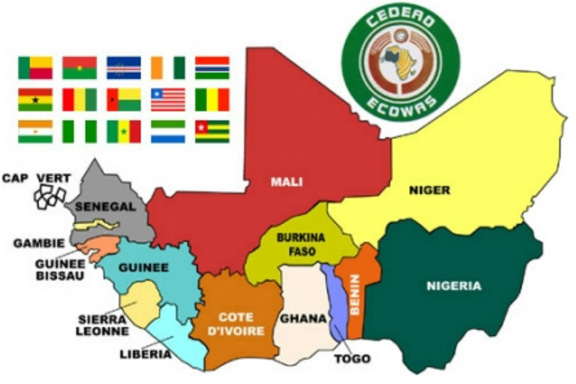Alarming Security Threats In The Ecowas Region
By Dr. Abdoulaye W Dukulé
The Perspective
Atlanta, Georgia
June 27, 2020
 |
|---|
| ECOWAS Countries |
The current Covid-19 has brought the entire world to a standstill. Economies in Africa will shrink by at least 2-3 percent according to the most optimistic predictions. It took the continent tremendous work and discipline to reach this level of growth. The continent contained 6 of the 10 fastest economies in the world and three of those (Senegal, Ghana, Cote d’Ivoire) were in West Africa. That progress has been stopped and will be reversed, plunging the sub-region into a new tunnel of social and economic challenges.
The ECOWAS region is not immune to global calamity. Beyond the health crisis that is still growing alarmingly in several countries, the community faces serious security threats linked both to terrorism, environmental issues as well as governance. The jihadists have destabilized northern Mali, making the Sahara region ungovernable. Almost a decade ago, Malian President Amadou Toumani Touré was overthrown by soldiers who claimed that he had taken strong stands against the rebellion in the north. Governments came and went but the rebellions extended to central Mali, entered Burkina Faso, and just two weeks ago, carried out its first attack on the Burkina Faso-Cote d’Ivoire border, killing 12 soldiers before evaporating in thin air.
Notwithstanding the presence of French and American forces, with the UN in the midst, who joined ECOWAS forces merged with the Chadian military, the jihadists continue to expand their reach southward. Fighters travel back and forth between the Libyan fronts (where they are handsomely rewarded) and the ECOWAS region. Meanwhile, around Lake Chad, Nigeria, Niger, Cameroon, and Chad are engaged in a hit-and-run battle with Boko Haram which is moving northward. As it was very predictable at the onset, the Sahara jihadists and Boko Haram have connected. Two different groups of Boko Haram have linked up with sections of the jihadists linked to ISIS or Al Qaeda in the region of Lake Chad.
The intervention of foreign troops seems to have only added another layer to the political confusion and lack of coordination and resolve in the fight against the terrorists, turning the region into a military playground. France, since De Gaulle in 1959, has long been trying to get a foothold in the Sahara, and now the instability provides a clear path to the area. Its military presence further strengthens its hold over former colonies. The US is in or out, depending on the days and its presence was only known after American military casualties were reported. The Sahara may provide an ideal training ground for military actions in the Middle East.
On the political front, things are not any better. Mali is in turmoil. Opposition parties and a popular Imam joining forces with the Union of Patriots (aka the June 5th Movement) to call for the resignation of the President. ECOWAS’s President and four West African Ministers of Foreign Affairs flew into Mali to intervene, but the opposition rejected any notion of a unity government. In Cote d’Ivoire, six months to the presidential elections of October 2020, uncertainties are clouding the political space because of the exclusion of powerful opposition leaders, such as former President Laurent Gbagbo and former President of the Assembly Soro Guillaume, both indicted and sentenced to prison terms and living in exile. In Guinea, referendum and constitutional reforms were held in a violence-filled atmosphere during the pandemic. President Alpha Condé seems bent to force walk his way into the next presidential elections although term limits forbid him. Guinea Bissau and Liberia are also facing both governance and economic challenges – Liberia just earned the unenviable title of the poorest nation on earth – that could become destabilizing while narco-politics is still crippling Guinea Bissau. Elections are also scheduled in Ghana and Burkina Faso, all potential sources of tension.
The community seems not to have drawn lessons from Ebola to create a regional response to pandemics. Although the West African Health Organization (WAHO) did a great job in fighting Ebola, it became dormant and there was no further concerted effort to build regional health structure. Covid-19 cases have been high in a few countries and number rising in others. There have been consultations through video Summits but there is no consensus on approach. Numbers are low, compared to other parts of the continent and community responses have been positive. Another important health issue is that from Dakar to Abuja, markets are infested with fake and dangerous fake medicine. Hopefully, the pandemic will force reflections and decisions on health.
To top the list, the advancing Sahara Desert is creating a population exodus from the arid north towards the south, leading to communal conflicts that have turned violent in Mali, Niger, Nigeria, and Burkina Faso. These hot spots could and will impact the stability of the entire region, especially when regarding food security. Drug trafficking is also becoming a serious calamity, with South American drug lords using fragile and corrupt security systems to use the region as a transit point to Europe and the US.
ECOWAS was just about to embark on historic steps by embracing one currency, liberalizing trade amongst community members, and making headways towards integration but the combined effects of governance issues and the Covid-19 could reverse the progress.
Of course, all of this can be stopped and overturned, because it is all made man, except the Sahara and Covid-19, which can also be managed.